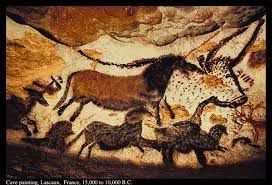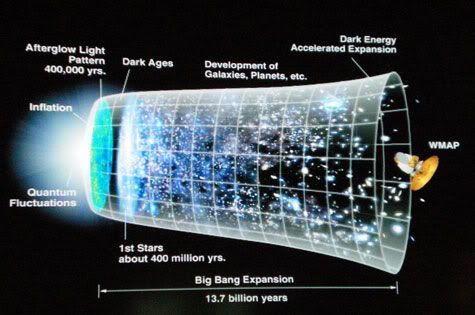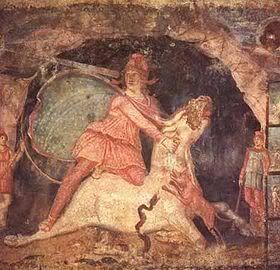
David Hume (1711-1776)
Hume is revered by the atheists as though he is the only philosopher they will listen to. Even those who say "Philosophy is bs" love and laud Hume. One of the most cherished things that Hume had to say was his misconceptions about miracles. Atheists treat that famous passage as though it has canonical status, for them it does. But Hume gets it wrong on both counts: he doesn't understand miracles, nor does he understand "laws of nature." Both observations are apparent form the opening line of the passage:
A miracle is a violation of the laws of nature;
The problem here is that science no longer regards nature as run by prescriptive laws. Every time I would argue that physical laws prescriptive, the atheist guru HRG (CARM ath) would tell me that this no longer the case. They are just descriptions of what happens. They are not real laws. But this in fact contradicts completely what their other guru, Hume, tells them. In fact they have to take this contradictory position if they want to argue against my third God argument Fire in the equations. It's also necessitated in their argument against final case. In fact Has was exaggerating, it's not as though no scientist still holds for prescriptive laws. the truth of it is there is a dispute in science between "regulaterians" and "Necessitarians." Nevertheless, those who say they are not prescriptive are contradicting Hume and rendering his point null. How can miracles violate laws if they only describe what happens? If they only describe, then miracles could just as well be part of the description, so there is noting to prevent them.
Actually laws of nature are not the confused with scientific laws or natural law.
Internet Encyclopedia of Philosophy
Laws of Nature are to be distinguished both from Scientific Laws and from Natural Laws. Neither Natural Laws, as invoked in legal or ethical theories, nor Scientific Laws, which some researchers consider to be the scientists' attempts to state or approximate the Laws of Nature, will be discussed in this article. Instead, this article explores issues in contemporary metaphysics. Within metaphysics, there are two competing theories of Laws of Nature. On one account, the Regularity Theory, Laws of Nature are statements of the uniformities or regularities in the world; they are mere descriptions of the way the world is. On the other account, the Necessitarian Theory, Laws of Nature are the "principles" which govern the natural phenomena of the world. That is, the natural world "obeys" the Laws of Nature. This seemingly innocuous difference marks one of the most profound gulfs within contemporary philosophy, and has quite unexpected, and wide-ranging, implications.
That throws up an even greater problem for the atheist. How many atheist told me that metaphysics is just fairy tales and that we don't need philosophy? Yet here is their great guru Hume using philosophy and Metaphysics no less! Be that as it may, here is a contradiction for them. If laws of nature or "laws of physics" in science (ether one) are merely descriptive, then where is the basis for standing against miracles?
Moreover, I say that Hume says miracles are a violation of the laws of Nature, but that is a misconception of the concept of miracle. First of all, it's a misconception of the supernatural to believe that supernatural means "breaking into the natural," or a "contradiction" to laws of nature. Supernatural is not a contradiction to the the laws of nature, they are framework in which the laws of nature make sense and in which the laws of nature have their warrant. The concept of the supernatural has been misconceived in modern times. It was first degraded in the Renaissance, and this process began with the dissolution of the medieval synthesis. See my pages on the Supernatural, (Doxa). Thus miracles are not violations of anything. They are, as C.S. Lewis put it occasions where the lower law bends to the higher (see his book on Miracles, sorry I don't have a page number or link). An example of what he's talking about is seen in Martin Luther King's speech ("I have a Dream") where he says "The arch of the moral universe is long, but it bends toward Justices." what is the talking about? The Supernatural is the ground and end of the natural. That's the framework, when I the SN is a larger framework in which the natural plays out, that's what I mean. The natural is rooted in the SN as it's origin and it is moving toward SN end which are set by the higher protocol. Thus when SN effects happen, it is because the lower is obeying the higher, not because the higher is breaking in.
Miracles are also contextual.It's almost meaningless to talk about them. Miracles could naturalistic because the dichotomy between SN and N is artificial and the creation of this modern era which sought to destroy religious thinking and to create a fixed standard of science as the umpire of reality and rule out all that is not part of their naturalistic ideology. The difference between miracles and "anomalies" is merely that miracles have a religious connotation. When an anomalous event happens and produces verification of a religious belief it's a miracle.
The nature of science as paradigm driven is also a major theoretical reason to quite thinking in terms of this dichotomy between N and SN. Science is not cumulative, scientific facts are stacked up until they equal truth. As Thomas Kuhn says, When the paradigm shifts the former anomalies in the old paradigm become the proofs of the new paradigm. The facts of the old paradigm become anomalies under the new. So facts are not stacking to equal progress, they are relative to the paradigm. The current paradigm is naturalism; that will change in some way eventually. when it does change the arguments and facts used to back naturalism will be extent,t hey will no longer be regarded as facts but useless anomalies. Hume's statement can't hold any real cogency for us because its entirely relative to the paradigm. It's already looking pretty out of date since the prevailing wind seems to be blowing in the direction of the descriptive laws of nature crowd. If laws are only descriptive, miracle can be part of the description. There is nothing to prevent them.
Hume goes on:
and as a firm and unalterable experience has established these laws, the proof against a miracle, from the very nature of the fact, is as entire as any argument from experience can possibly be imagined.
Here we have the essence of circular reasoning. Now any atheists have to tried to sell this passage on the basis that he's not saying that laws of nature are prescriptive laws but that our experience of them is unalterably. In fact he is saying nothing more than, as they would have us believe: we never see miracles so we must assume they never happen, they are not part of the description. I think it's clear he's not saying that. I think it is clear that he's saying laws of nature (and thus "the laws of physics") are prescriptive and unalterable. He speaks of unalterable. Now it's true he says the experience is unalterable. But it's the experience of the laws he says. So he is saying that the laws are unalterable and thus our experience of them is as well. If not, then there could some day be an exception. If one saw a miracle at some point that would still have to invalidate all the observations of the past, unless one assumes that there is a prescriptive element and that's why the observe rations are always the same.
The circle in reason is here: we do see miracles. There are thousands of claims of miracle. There are 4000 remarkable cases at Lourdes. That means they are amazing, they can't explained. They fail to be declared official only because of some technicality. But Hume would, at least in the interpretation of most atheist, we must discount hose cases because according to our experiences they don't happen. So those must be hoaxes. Yet, they do happen according to our experiences, becasue these are the ones' that people have experienced.
This is so obviously circular reasoning:
X doesn't happen because we never see X
we can discount claims that people have seen x because:
we never see x.
Hume:
Why is it more than probable, that all men must die; that lead cannot, of itself, remain suspended in the air; that fire consumes wood, and is extinguished by water; unless it be, that these events are found agreeable to the laws of nature, and there is required a violation of these laws, or in other words, a miracle to prevent them?
Here he clearly appeals to the authority of the laws of nature, they prevent them, to happen they must be agreeable. That means his views are metaphysics, they validate the need for metaphysical observation. They are also outmoded and relative to the philosophical discussion still progressing. I've seen atheist vow and declare that his argument is totally about the regularity of our observations, not prescriptive laws. Here he clearly says whatever happens must agree with the laws.
Hume:
Nothing is esteemed a miracle, if it ever happen in the common course of nature.
Here I take issue on the grounds that he doesn't understand the true concept of the supernatural.Miracles are contextual not "factual."
It is no miracle that a man, seemingly in good health, should die on a sudden: because such a kind of death, though more unusual than any other, has yet been frequently observed to happen.
Here he intentionally blurs the discretion between the perspective nature of laws and the observation of frequency of behavior. I think he is purposely blurring the distinction. He shifts it back over to what he sees happen because it's the only basis he has for denying the resurrection. He can't argue that there's a physical law against it, except by the implication that we never see it, as argument from sing. He has the weight of common experience, and yet it is only argument from sign, thus dangerously close to fallacy. There is no "structural reason" from the laws of nature that would prevent it.
But it is a miracle, that a dead man should come to life; because that has never been observed in any age or country. There must, therefore, be a uniform experience against every miraculous event, otherwise the event would not merit that appellation....
Doubly fallacious because miracles are supposed to be contradictions to what we see. In trying to say it can't happen because it's not naturalistic he's merely evoking the ideology of naturalism in order to impose the circular reasoning that naturalists accept axiomatically.
Hume's logic:
Atheist: The Res couldn't happen because it violates what we observe
Believer: but some people did observe it, so it is part of what we observe
Atheist: no it can't because we never observe such things.
But of course, we did that time. It's a circular reasoning that is used to ignore counter proofs on the premise that they can't exist because if they did they would be counter, we can't have that! The truth of it is there are millions of claims that miracles are seen and that they happen.
The plain consequence is (and it is a general maxim worthy of our attention), 'That no testimony is sufficient to establish a miracle, unless the testimony be of such a kind, that its falsehood would be more miraculous, than the fact, which it endeavours to establish....'
Of course this is meaningless prattle. It's more circular reasoning. He is saying that because miracles contradict our ordinary observation (which of course they should because that's their definition) then to establish it it would have to be more amazing that it would not be true." But of course if that was the case then would would have to say "that X isn't true contradicts our regular observation of the world." Now how could it be that miracles not being true could ever be so obscure a condition that they would contradict our normal experience? In such a case our normal experience would be miracles. thus they would not be miracles. This is so like the dictum about extraordinary evidence. I'm sure that's Sagan got it. The problem with that is it's absurd because no one can say what "extraordinary" evidence is. It's just a trick so atheists can keep raising the bar. Of course this what they always do. No evidence is ever good enough.
When anyone tells me, that he saw a dead man restored to life, I immediately consider with myself, whether it be more probable, that this person should either deceive or be deceived, or that the fact, which he relates, should really have happened. I weigh the one miracle against the other; and according to the superiority, which I discover, I pronounce my decision, and always reject the greater miracle. If the falsehood of his testimony would be more miraculous, than the event which he relates; then, and not till then, can he pretend to command my belief or opinion.
In the foregoing reasoning we have supposed, that the testimony, upon which a miracle is founded, may possibly amount to an entire proof, and that the falsehood of that testimony would be a real prodigy: But it is easy to shew, that we have been a great deal too liberal in our concession, and that there never was a miraculous event established on so full an evidence.
In fact this quote basically says "our ideology rules out miracle a priori so ignore any evidence because it's ideologically improper." By the circular reasoning of the ideology any contrary evidence must be ruled because it is contrary.
Clearly the more rational standard would be to take whatever cannot be explained, having been documented with sufficient evidence to establish veracity, as assumed miraculous if violates our sense of "normal" reality, with out any biased pre determination as to the possibility of such events. By definition miracles are anomalies. Anomalies are absorbed into the paradigm until so many have been absorbed that the paradigm can no longer hold them, then the paradigm shifts. Kuhn establishes that when paradigms shift the supporters of the old regime defend it just as though and in the same way as supporters of the old guard stave off a mounting resolution. For this reason we can expect the paradigm to be defend by an ideology, and one that unfairly rules out any change. Such is clearly the case. We see that the paradigm has shifted from "materialism" to naturalism and physical ism. This is because materialism couldn't hold the anomalies. The paradigms they are shifting from physicalism to property dualism and other smile face versions of physicalism which are closer to being miracle friendly. This I will take up next time.







Let's try this again. Part 2 of 3: Brap: 6.